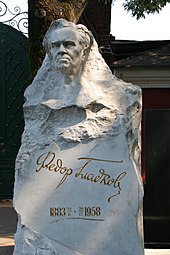Fyodor Wassiljewitsch Gladkov
Feodor Gladkov ( Russian Фёдор Васильевич Гладков * 9 . Jul / 21st June 1883 greg. In the village Tschernawka in today's Saratov Oblast ; † 20th December 1958 in Moscow ) was a Russian - Soviet writer.
Life
He was born into a family of Orthodox parents in a village in the Volga region near Saratov and spent his childhood in Yekaterinodar , where he also went to school.
As a teenager he worked as an assistant teacher in Siberia east of Lake Baikal . In 1905 he went to Tbilisi and was trained there at a teachers' institute. In 1906 he was arrested for revolutionary propaganda and spent four years in exile in Siberia. After exile, he lived for a few years in Novorossiysk on the Black Sea and was the main teacher of an elementary school in the Kuban area , the home of his childhood , from 1914 to 1917 . In 1918 he had to flee as a Bolshevik during the Russian Civil War and found shelter in a cement factory with workers.
After the White Cossacks from the Kuban were defeated by the Red Army soldiers in 1920 , Gladkow was used as the people's representative for regional school education. In 1921 he was appointed to Moscow, where he worked as a journalist and writer. From 1932 he worked for the magazine Nowy Mir ("New World") and during the Second World War he was a correspondent for the newspapers Pravda and Izvestia in the Urals .
Gladkow has been writing since his Siberian exile, and his early stories are reminiscent of Maxim Gorki's early works in terms of style and subject matter . In 1925 he published his best-known literary work with the novel Zement , which also has autobiographical features and is considered a literary monument of the early Soviet industrialization epoch (here using the example of a cement factory ).
From 1945 to 1948 Gladkow was director of the Literature Institute in Moscow. For his services he received the Stalin Prize in 1950 and 1951 . He died on December 20, 1958 and was buried in the Novodevichy Cemetery in Moscow.
Works (selection)
-
Cement . Translated from Russian by Olga Halpern. Publishing house for literature and politics, Vienna 1927.
- Cement. Novel . With new commentary and further documents. Oberbaumverlag, Berlin 1972.
- Fjodor Gladkow, Heiner Müller : cement . With an appendix ed. by Fritz Mierau . Reclam, Leipzig 1975. (= Reclam's Universal Library 638)
- Marussja causes confusion. Novel . Translated from the Russian by Josef Kalmer and Boris Krotkow. Tal, Vienna, Leipzig 1930.
- Ugryumov tells about the prison . Translated from the Russian by Josef Kalmer and Boris Krotkow. E. Prager Verlag, Leipzig - Vienna 1931. (= The face of time. A series for everyone 1)
- New earth. Novel . Translated from Russian by Olga Halpern, Publishing House for Literature and Politics, Vienna 1931.
- Energy. Novel . Translated from Russian by Olga Halpern. Ring Verlag, Zurich 1935.
- The snow melts. Childhood memories . Translated from the Russian by Cornelius Bergmann . Röth, Kassel 1956. (= The world )
- The birch grove . Translated from the Russian by Larissa Robiné . Afterword by Günter Warm . Insel Verlag, Leipzig 1976. (= Insel Bücherei 1088)
Web links
- Literature by and about Fjodor Wassiljewitsch Gladkow in the catalog of the German National Library
- Article Fyodor Gladkow in the Great Soviet Encyclopedia (BSE) , 3rd edition 1969–1978 (Russian)
- Gladkow on hrono.ru (Russian)
- Gladkow on peoples.ru (Russian)
- Fyodor Gladkow: Cement full online edition
| personal data | |
|---|---|
| SURNAME | Gladkow, Fyodor Wassiljewitsch |
| ALTERNATIVE NAMES | Gladkow, Fyodor Wasiljewitsch; Гладков, Фёдор Васильевич (Russian) |
| BRIEF DESCRIPTION | Russian-Soviet writer |
| DATE OF BIRTH | June 21, 1883 |
| PLACE OF BIRTH | Chernavka |
| DATE OF DEATH | December 20, 1958 |
| Place of death | Moscow |

